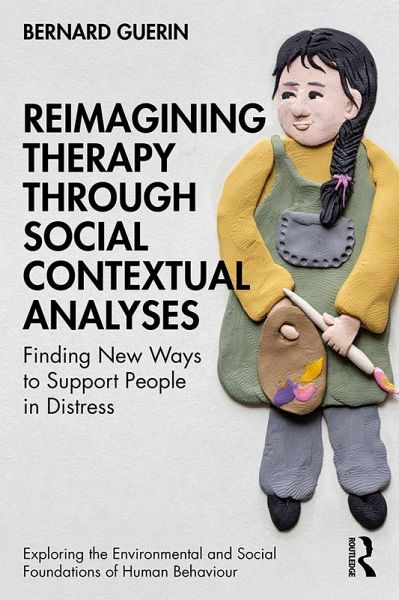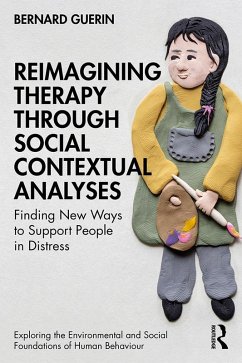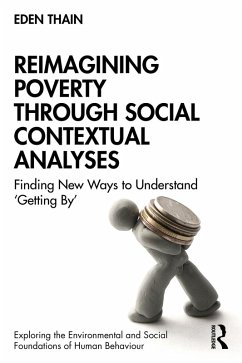
Reimagining Therapy through Social Contextual Analyses (eBook, ePUB)
Finding New Ways to Support People in Distress
Versandkostenfrei!
Sofort per Download lieferbar
31,95 €
inkl. MwSt.
Weitere Ausgaben:

PAYBACK Punkte
16 °P sammeln!
This book attempts to 'shake up' the current complacency around therapy and 'mental health' behaviours by putting therapy fully into context using Social Contextual Analysis; showing how changes to our social, discursive, and societal environments, rather than changes to an individual's 'mind', will reduce suffering from the 'mental health' behaviours.Guerin challenges many assumptions about both current therapy and psychology, and offers alternative approaches, synthesized from sociology, social anthropology, sociolinguistics, and elsewhere. The book provides a way of addressing the 'mental h...
This book attempts to 'shake up' the current complacency around therapy and 'mental health' behaviours by putting therapy fully into context using Social Contextual Analysis; showing how changes to our social, discursive, and societal environments, rather than changes to an individual's 'mind', will reduce suffering from the 'mental health' behaviours.
Guerin challenges many assumptions about both current therapy and psychology, and offers alternative approaches, synthesized from sociology, social anthropology, sociolinguistics, and elsewhere. The book provides a way of addressing the 'mental health' behaviours including actions, talking, thinking, and emotions, by taking people's external life situations into account, and not relying on an imagined 'internal source'. Guerin describes the broad contexts for current Western therapies, referring to social, discursive, cultural, societal, and economic contexts, and suggests that we need to research the components of therapies and stop treating therapies as units. He reframes different types of therapy away from their abstract jargons, offering an alternative approach grounded in our real social worlds, aligning with new thinking that challenges the traditional methods of therapy, and also providing a better framework for rethinking psychology itself. The book ultimately suggests more emphasis should be put on 'mental health' behaviours as arising from social issues including the modern contexts of extreme capitalism, excessive bureaucracy, weakened discursive communities, and changing forms of social relationships.
Practical guidelines are provided for building the reimagined therapies into clinics and institutions where labelling and pathologizing the 'mental health' behaviours will no longer be needed. By putting 'mental health' behaviours and therapy into a naturalistic or ecological social sciences framework, this book will be practical and fascinating reading for professional therapists, counsellors, social workers, and mental health nurses, as well as academics interested in psychology and the social sciences more generally.
Guerin challenges many assumptions about both current therapy and psychology, and offers alternative approaches, synthesized from sociology, social anthropology, sociolinguistics, and elsewhere. The book provides a way of addressing the 'mental health' behaviours including actions, talking, thinking, and emotions, by taking people's external life situations into account, and not relying on an imagined 'internal source'. Guerin describes the broad contexts for current Western therapies, referring to social, discursive, cultural, societal, and economic contexts, and suggests that we need to research the components of therapies and stop treating therapies as units. He reframes different types of therapy away from their abstract jargons, offering an alternative approach grounded in our real social worlds, aligning with new thinking that challenges the traditional methods of therapy, and also providing a better framework for rethinking psychology itself. The book ultimately suggests more emphasis should be put on 'mental health' behaviours as arising from social issues including the modern contexts of extreme capitalism, excessive bureaucracy, weakened discursive communities, and changing forms of social relationships.
Practical guidelines are provided for building the reimagined therapies into clinics and institutions where labelling and pathologizing the 'mental health' behaviours will no longer be needed. By putting 'mental health' behaviours and therapy into a naturalistic or ecological social sciences framework, this book will be practical and fascinating reading for professional therapists, counsellors, social workers, and mental health nurses, as well as academics interested in psychology and the social sciences more generally.
Dieser Download kann aus rechtlichen Gründen nur mit Rechnungsadresse in A, B, BG, CY, CZ, D, DK, EW, E, FIN, F, GR, HR, H, IRL, I, LT, L, LR, M, NL, PL, P, R, S, SLO, SK ausgeliefert werden.













